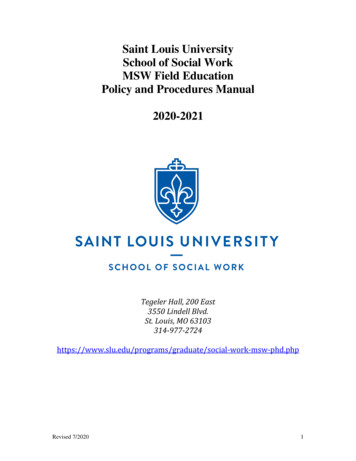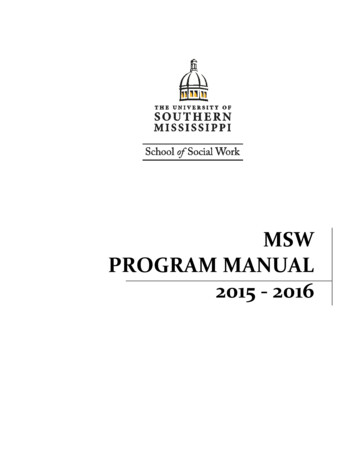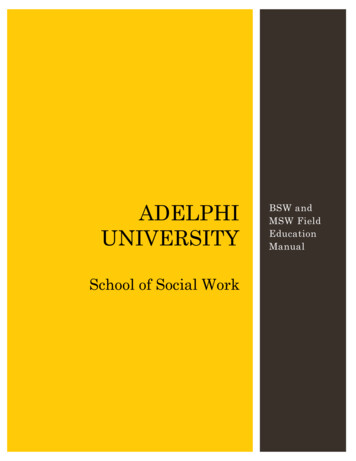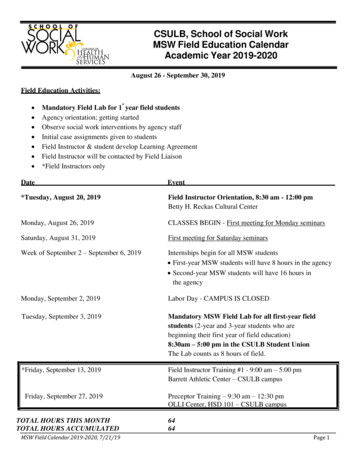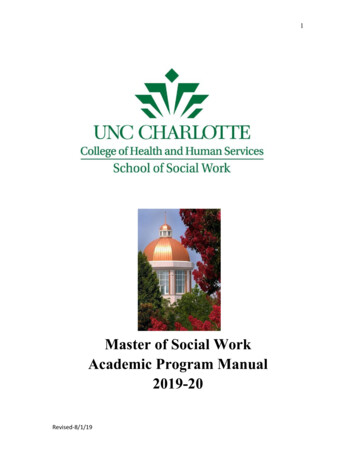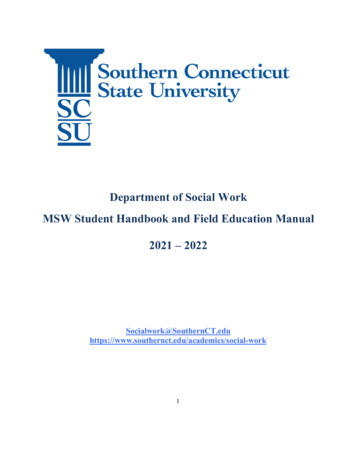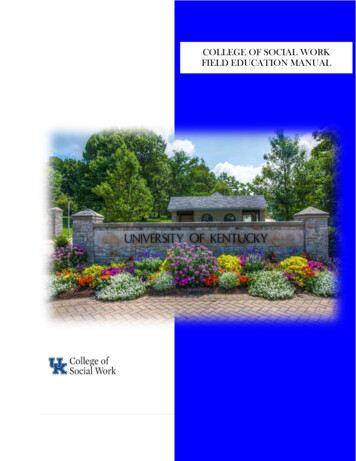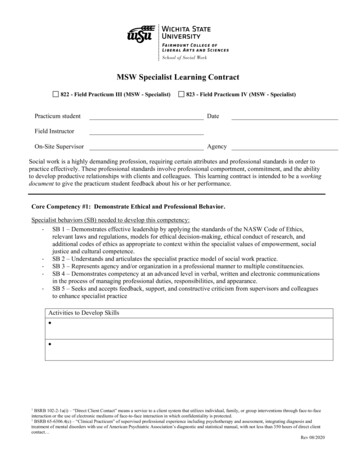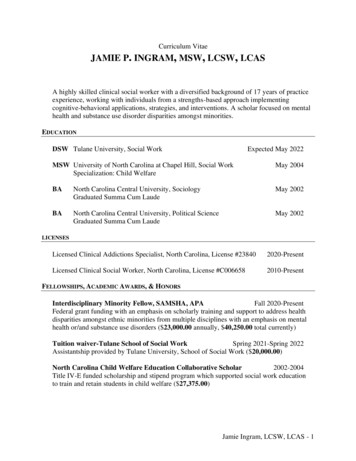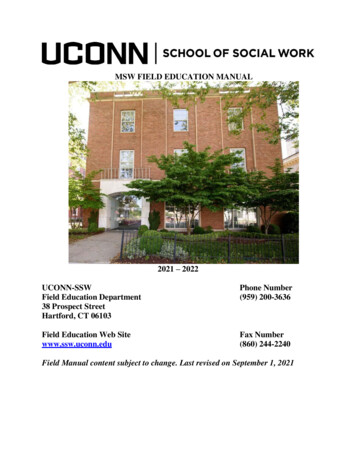
Transcription
MSW FIELD EDUCATION MANUAL2021 – 2022UCONN-SSWField Education Department38 Prospect StreetHartford, CT 06103Phone Number(959) 200-3636Field Education Web Sitewww.ssw.uconn.eduFax Number(860) 244-2240Field Manual content subject to change. Last revised on September 1, 2021
Table of ContentsFIELD EDUCATION AND CAMPUS CONTACT INFORMATION . 6Contacts for Field Education . 6Campus Office Numbers . 6Primary Changes to Field Education in the Context of the COVID-19 Pandemic:. 7UCONN SCHOOL OF SOCIAL WORK . 9MISSION STATEMENT. 9POLICY AGAINST DISCRIMINATION, HARASSMENT AND . 9MSW CURRICULUM REQUIREMENTS. 9VALUES AND ETHICS. 10FIRST AMENDMENT RIGHTS . 10AGENCY-BASED VOTER REGISTRATION. 10OVERVIEW OF FIELD EDUCATION . 11THE PLACE OF FIELD EDUCATION IN THE TOTAL CURRICULUM . 11CSWE NINE CORE COMPETENCIES OF SOCIAL WORK PRACTICE (as per CSWE’s 2015 . 11BEHAVIORS FOR EACH OF THE 9 COMPETENCIES. 11FIELD EDUCATION REQUIREMENTS AND PLACEMENT OPTIONS. 12Hours in Field: . 12Academic Courses and Field Placement to be Completed Concurrently:. 12Structures Available for Field Placements: . 12IGFP Summer Block . 13Community Organizing Fall Block . 14Student Eligibility. Students must: . 14Application Process . 14Program Requirements . 14Employed Social Work Program (ESW): . 15International Placement:. 16Dual Degree Field Placements: . 16ENSURING GENERALIST YEAR STUDENTS GAIN GENERALIST PRACTICE SKILLS IN THE FALL OF 1ST YEAR IN FIELD 17SATISFACTORY ACADEMIC PROGRESS . 17CRITERIA FOR ENTERING INTO AND CONTINUING IN THE FIELD . 18RESPONSIBILITIES FOR FIELD EDUCATION . 181
Field Education Department's Educational Responsibilities include: . 19Field Education Department’s Administrative Responsibilities include: . 19Responsibilities Shared by the Field Education Department and Faculty Advisors include: . 19FIELD EDUCATION POLICIES . 19Process Recordings:. 20Field Practicum Extension: . 20Excused Absences: . 20Holidays: . 20Absences Due to Special Circumstances: . 20Compensatory Time: . 21Labor Strikes: . 21Grades for Field Education:. 21Field Related Expenses: . 21Time to Travel to Placement Site: . 21Use of Student’s Own Cars for Transporting Clients: . 21Disclosure of Student Status: . 21Liabilities:. 22Home Visit Policy:. 22Narcan: . 22Student Malpractice Policy: . 22Accommodations: . 22Confidentiality of Student Educational Records:. 23Confidentiality of Patient Information and Agency Records: . 23CRITERIA FOR THE SELECTION OF FIELD SETTINGS . 23CRITERIA FOR THE SELECTION OF FIELD INSTRUCTORS . 23Non-MSW Field Instructors: . 24Shared Task Supervisor/MSW Field Instruction: . 24FIELD PLACEMENT PROCESS & PROCEDURES . 26Incoming students: . 26Returning students: . 26Block Placement: . 27Background Checks and Immunizations: . 27MSW PROGRAM - BACKGROUND CHECKS AND IMMUNIZATION FAQ SHEET. 27FIELD PRACTICUM REQUIREMENTS: . 272
Additional Field Placement Experience Requirements: . 29RESOURCES AT THE SSW AND UCONN TO TALK WITH ABOUT MY SITUATION . 30FACULTY ADVISING. 31The Field Component of Faculty Advising Responsibilities includes:. 31Tasks and Activities: . 31The Academic Component of Faculty Advising Responsibilities follows: . 32Tasks and Activities: . 32PROBLEMS IN THE FIELD . 33Field Replacements: . 33Appeal Procedures: . 33BENEFITS FOR CURRENT FIELD INSTRUCTORS . 33ORIENTATION FOR FIELD INSTRUCTORS . 33SEMINAR IN FIELD INSTRUCTION (SIFI) . 33RECOMMENDED STUDENT ORIENTATION TO AGENCY . 33SAFETY AND SECURITY PROCEDURES . 34Basic Principles of Personal Safety Risk Management Strategies for Social Work Interns: . 35GENERALIST FIELD CURRICULUM . 36Overview of Field Requirements, Curriculum and Activities: . 36For complete information about the MSW courses offered and co- and pre-requisites see the SSW MSWStudent Handbook. . 37FIRST SEMESTER GENERALIST YEAR (All Students) . 38Field Education Generalist Curriculum: Competencies and Behaviors: . 38Second Semester of First Year Field: Additional Behaviors (By Specialized Practice Area) . 38EDUCATIONAL CONTRACTS. 38FIELD EVALUATIONS . 39FIELD ADVISING SEMINARS. 40FED 5301-5302/FED 5310-5311 . 40Learning/Teaching Formats. 40Evaluation of Student Learning . 40Required Reading . 40SUGGESTED THEMES . 41SESSION I: Beginnings in Field Instruction and Practice . 41SESSION II: Work Phases in Field Instruction and Practice . 41SESSION III: Work Phases and Diversity (This session follows a program on diversity) . 413
SESSION IV: Closures . 41SPECIALIZED PRACTICE AREAS . 41INDIVIDUAL, GROUP, AND FAMILY PRACTICE (IGFP) . 42IGFP EDUCATION IN THE FIELD . 42IGFP FIELD ASSIGNMENTS . 43Recommended Case Assignments/In-Person Contact hours:. 43Students doing 20 hours per week internship: . 43Students doing 15 hours per week internship: . 43Case Assignments and Course Work: . 43Expectations of Supervision: . 44Expectations for Written Work (IGFP): . 44SEQUENCING AND OBJECTIVES OF REQUIRED COURSES . 47COMMUNITY ORGANIZING . 48COMMUNITY ORGANIZING EDUCATION IN THE FIELD . 48BUILDING ON GENERALIST KNOWLEDGE AND PRACTICE SKILLS . 49COMPETENCIES AND SPECIALIZATION BEHAVIORS . 49Five Community Organizing courses are required: . 49For detailed information about the Community Organizing Specialized Practice Area and MSW curriculum,see the MSW Student Handbook on the UConn SSW website. . 49POLICY PRACTICE . 50POLICY PRACTICE EDUCATION IN THE FIELD . 50COMPETENCIES AND SPECIALIZATION BEHAVIORS . 50Five Policy Practice courses are required:. 50For detailed information about the Policy Practice Specialized Practice Area and MSW curriculum, see theMSW Student Handbook on our UConn SSW website. 50Process Recordings:. 50APPENDICES . 52Appendix IPUBLIC ACT No. 78-54 AN ACT CONCERNING LIABILITY FOR STUDENTS IN FIELD PLACEMENTPROGRAMSA 52Appendix IIGuides for Process Recordings . 52Appendix IIIIGFP Monthly Activity Reporting Form . 52Appendix IVUConn School of Social Work: GUIDE for Agency Visit . 52Appendix VACTIVITIES CHECKLIST for MSW Faculty Advisors . 52Appendix VIField Educational Contracts and Evaluation Forms / Timing and Process . 524
APPENDIX IIa GUIDE FOR PROCESS RECORDING . 56Appendix IIb. GUIDE FOR PROCESS RECORDING . 59Appendix IIc.GUIDE FOR PROCESS RECORDING . 62Appendix IId. GUIDE FOR PROCESS RECORDING . 64Appendix IIe.GUIDE FOR PROCESS RECORDING. 67Appendix IIf. PROCESS RECORDING FOR POLICY PRACTICE AND COMMUNITY ORGANIZING STUDENTS . 68Appendix IIg. For All Specialized Practice Areas: A General Process Recording . 81Appendix IIh. For All Specialized Practice Areas: Process Recording Format For Meetings . 825
FIELD EDUCATION AND CAMPUS CONTACT INFORMATIONContacts for Field EducationFor more information about the Field EducationProgram, contact:Tel: (959) 200-3636Campus Office NumbersAll numbers start with (959) 200-Nancy UrcinasStaff Administrative ServicesSpecialist II(959) 200-3610nancy.urcinas@uconn.eduDean’s Office 3649IT 3666Library 3466Security 3683Office of Outreach (STEP) 3617Office of Student & Academic Services 3687Nicole Campbell, DSW, LCSWDirector of Field Education(959) 200-3615nicole.campbell@uconn.eduInstitute, Center, and Project NumbersCheryl Jackson-Morris, MSWAssociate Director of Field Education(959) 200-3609cheryl.jackson-morris@uconn.eduAll numbers start with (959) 200Center for International Social WorkStudies 3673Nancy A. Humphreys Institute for PoliticalSocial Work 3639Puerto Rican & Latin@ Studies Project 3679Liane Lussier-Smith, MSW,LCSWField Coordinator(959) 200-3608liane.lussier-smith@uconn.eduGina DeVivo Brassaw, MSWField Coordinator(959) 200-3607gina.devivo brassaw@uconn.edu6
Primary Changes to Field Education in the Context of the COVID-19 Pandemic:UConn, like all universities, had to modify academic programs, beginning with the academic year 2020-2021,because of the ongoing coronavirus pandemic. At the start of the 2020-2021 academic year, many School of SocialWork students took many, if not all, of their courses in distance learning formats in the Fall 2020 semester. Ourpartner agencies also had to adapt to restrictions on usual in-person services. This had implications for their abilityto accommodate student field placements and provide supervision. In some cases, work at these agencies was doneremotely and through tele-health. The Field Education Office worked closely with these agencies in preparing our2020-2021field education plan.In the context of the pandemic during the 2020-2021 academic year, several key changes were made tothe SSW’s field education requirements in keeping with national and state guidance and policy changesmade by the SSW’s accrediting body, the Council on Social Work Education (CSWE).1For the current 2021-2022 academic year, the School for Social Work has returned to in-personformats for the majority of coursework and field placements, following University guidelines. The FieldEducation Department has made these changes as well. Students are expected to participate in-person infield placements this academic year.1. Field Unit or Agency-based field placements expected for all students for at least part of the 20212022 year:The SSW expects to place every student in a field unit or agency-based field placement during 2021-2022academic year. All students eligible for field placements will be placed in a field unit or agency settingduring the academic year, with in-person contact with clients and/or agency constituents.2. Reduction of required field hours required for graduation in 2022:All MSW students must complete 435 hours in field during the 2021-2022 academic year.Advanced Standing students graduating 2022 must complete a minimum of 765 field hours in order tograduate. They will count undergraduate field hours toward this total.All other MSW students graduating in 2022 must complete a total of 855 hours of field (for two years) inorder to graduate.These required field hours are in keeping with the updated CSWE accreditation statement on March 18,2021 for field placement courses that are partially or fully completed by May 31, 2022 (“CSWE tionPDFs/DOSWA-FAQs-to-COVID-19-3-18-21.pdf3. Remote assignments expected for some students for part of the year:In the event that an agency field placement unit or agency-based field placement cannot be confirmed bythe start date of September 7, 2021, “remote assignments” may be considered for those students. These“remote arrangements” will be developed through the Field Department. Students will receive credit forfield hours for completing these assignments (not to exceed 30 days or 60 hours).1See the following from CSWE: (1) March 18, PDFs/DOSWA-FAQs-to-COVID-19-3-18-21.pdf7
4. Number of hours in field during 2021-2022 academic year:MSW “in-field” students are expected to complete fifteen (15) hours a week of field work each week untilat least April 22, 2022 (435 hours total). Some agencies may require additional hours or have an end datepast April 22nd.5. Field supervision hours field seminar hours and remote field activities (if applicable) count towardsfield hours:During the 2021-2022 academic year, in keeping with the CSWE and Commission on AccreditationStatement Update March 18, 2021, DOSWAFAQs-to-COVID-19-3-18-21.pdf, the SSW will allow for remote field activity, field supervision and fieldseminar hours to count toward MSW students’ field hours.6. More flexible Employed Social Work (ESW) placements in 2021- 2022 academic year:In keeping with the June 12, 2020 CSWE COA guidance on employment-based field, the SSW will bemore flexible in the use of ESW placements for MSW students in the 2021-2022 academic year in thecontext of the COVID-19 pandemic (CSWE Commission on Accreditation Response to the NADDSubcommittee Report on Field Education, esponse-to-NADD-Field-Subcommitte-Report.pdf? zs URMte1& zl VV7s6).7. Remote MSW Field Seminars in Fall 2021:Fall 2021/ Spring 2022 MSW Field Seminars will be held using video conferencing (e.g., WebEx).8. Remote Site visits by Faculty Advisors:It is the expectation that faculty advisors will conduct in-person site visits with Field Instructors andstudent advisees unless the site agency has a policy against outside visitors. The Field EducationDepartment will continue to monitor conditions related to the pandemic and modify decisions related to inperson site visits as needed.9. Online orientation and SIFI for new field instructors (SIFI):In the Fall of 2021, the SSW will hold remote orientation for all new MSW Field Instructors. In addition,the Seminar in Field Instruction (SIFI) will be online.Details about field changes that are temporary during the COVID-19 pandemic can be found on the UConnSSW website in the COVID-19 FAQ section. The FAQ sheet will be updated during the year to reflect anymajor developments, as needed.CSWE Department of Social Work Accreditation Response to COVID-19, FAQs & Field Guidance.8
UCONN SCHOOL OF SOCIAL WORKMISSION STATEMENTThe mission of the UConn School of Social Work is to provide professional bachelors, masters, doctoral andcontinuing professional social work education which will promote social and economic justice, and theimprovement of human well-being. This mission derives from the University's commitment to excellence inteaching, research and scholarship, service and outreach, an expanding international role, and commitment topublic service. The School is committed to helping students become professional social workers by developingprofessional values and ethics, judgment and skills that equip them for life-long critical analysis of theirpractice, of social welfare services and of the context of society's social, economic and political structures. TheSchool is also committed to teaching advanced, research-informed practice methods, focusing on strengths ofindividuals and families, groups, communities, and organizations, and the practice of social policy. Graduatesare prepared to lead in contexts that shape practice by valuing human diversity, working for human rights andagainst oppression and discrimination, preventing and alleviating the effects of violence and poverty,particularly in urban centers, and advocating for improved social policies and services, locally and globally.POLICY AGAINST DISCRIMINATION, HARASSMENT ANDRELATED INTERPERSONAL VIOLENCEThe University is committed to maintaining an environment free of discrimination or discriminatoryharassment directed toward any person or group within its community – students, employees, or visitors.Academic and professional excellence can flourish only when each member of our community is assured anatmosphere of mutual respect. All members of the University community are responsible for the maintenanceof an academic and work environment in which people are free to learn and work without fear ofdiscrimination or discriminatory harassment. In addition, inappropriate amorous relationships can underminethe University’s mission when those in positions of authority abuse or appear to abuse their authority. To thatend, and in accordance with federal and state law, the University prohibits discrimination and discriminatoryharassment, as well as inappropriate amorous relationships, and such behavior will be met with appropriatedisciplinary action, up to and including dismissal from the University. Additionally, to protect the campuscommunity, all non-confidential University employees (including faculty) are required to report sexualassaults, intimate partner violence, and/or stalking involving a student that they witness or are told about tothe Office of Institutional Equity (OIE). Please be aware that while the information you provide will remainprivate, it will not be confidential and will b
MSW "in-field" students are expected to complete fifteen (15) hours a week of field work each week until at least April 22, 2022 (435 hours total). Some agencies may require additional hours or have an end date past April 22nd. 5. Field supervision hours field seminar hours and remote field activities (if applicable) count towards
